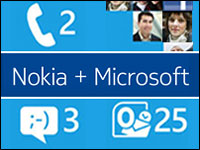
Nokia has been expected for some time to announce plans to get into the tablet space. It has now confirmed, via an interview by Nokia design chief Marko Ahtisaari to the Finnish magazine Kauppalehti Optio, that work is progressing on a Windows 8 tablet device.
That Nokia is opting for Windows 8 instead of Android is hardly a surprise, given Nokia Chief Executive Stephen Elop’s history with Microsoft. Still, there are many questions surrounding the endeavor. What can Nokia bring to the tablet market that is unique? Will its special relationship with Microsoft give it a leg up over the scores of other iPad tablet contenders either on the market or coming soon? Can it translate its cellphone-building chops to tablets?
Well Executed, High Quality
Granted, this is Nokia’s first tablet, but “given what they have done in the mobile space, there is every reason to believe it will bring a high-quality, well-executed product to market,” John Jackson, principal with CCS Insight, told TechNewsWorld.
Nokia did make a misstep when it attempted to compete in the netbook space, recalled IDC analyst Bob O’Donnell.
“It was a beautiful product that was overengineered and overpriced,” he told TechNewsWorld. “I don’t think they’ll make that mistake again with a tablet, but I have no doubt they will come up with an interesting product.”
Microsoft Ties
It is almost certain that Nokia will leverage the relationship it has with Microsoft to gain an edge in the tablet market, Charles King, principal of Pund-IT, told TechNewsWorld.
When Elop was hired, there was rampant speculation that Nokia would not only become a major Microsoft ally, but also make some radical moves into unfamiliar areas, he said. “I would say a Windows 8 tablet qualifies on both counts.”
Much will depend on execution, added King, and Nokia is clearly not the company it was four or five years ago. However, on its side is the fact that the tablet market is still uncertain and evolutionary.
“Nokia still has some pieces to play,” he said, “and tablets could be a very interesting spot for them, especially teamed up with Microsoft.”
Reasonable Price Point
One concern is that Nokia will need to find the optimal price point to gain traction in the market, suggested O’Donnell.
Pricing will be important, Jackson agreed. “One issue will be what Microsoft will charge for an OEM license fee. This is, in fact, what all the manufacturers are wondering. We can presume it will be fair and competitive, but there is still that unknown about the incremental costs.”
What Does Windows 8 Stand For?
A bigger unknown may be Windows 8 itself.
“Right now, we have the expectation that Windows 8 tablets will be in the market sometime in Q4, but beyond that we know very little of what they stand for — what they will be able to do,” said Jackson. It is a question that all Windows 8 tablet manufacturers are wrestling with right now.
Certainly, there will be opportunities in the enterprise vertical, but those are by definition niche, Jackson continued. “A consumer-oriented device is what I suspect Windows 8 will be, and that is where Nokia and the others will have their greatest challenge — positioning it to be distinct from the Apple and the Android tablets in the minds of consumers.”
It can be done, Jackson added. Nokia has particular expertise in mapping and navigation — areas that will add utility to a tablet, for example.
In general, it makes sense for Nokia to enter the tablet space, Jackson said. “It also makes sense, though, for them to temper their expectations around what they can achieve.”




















































